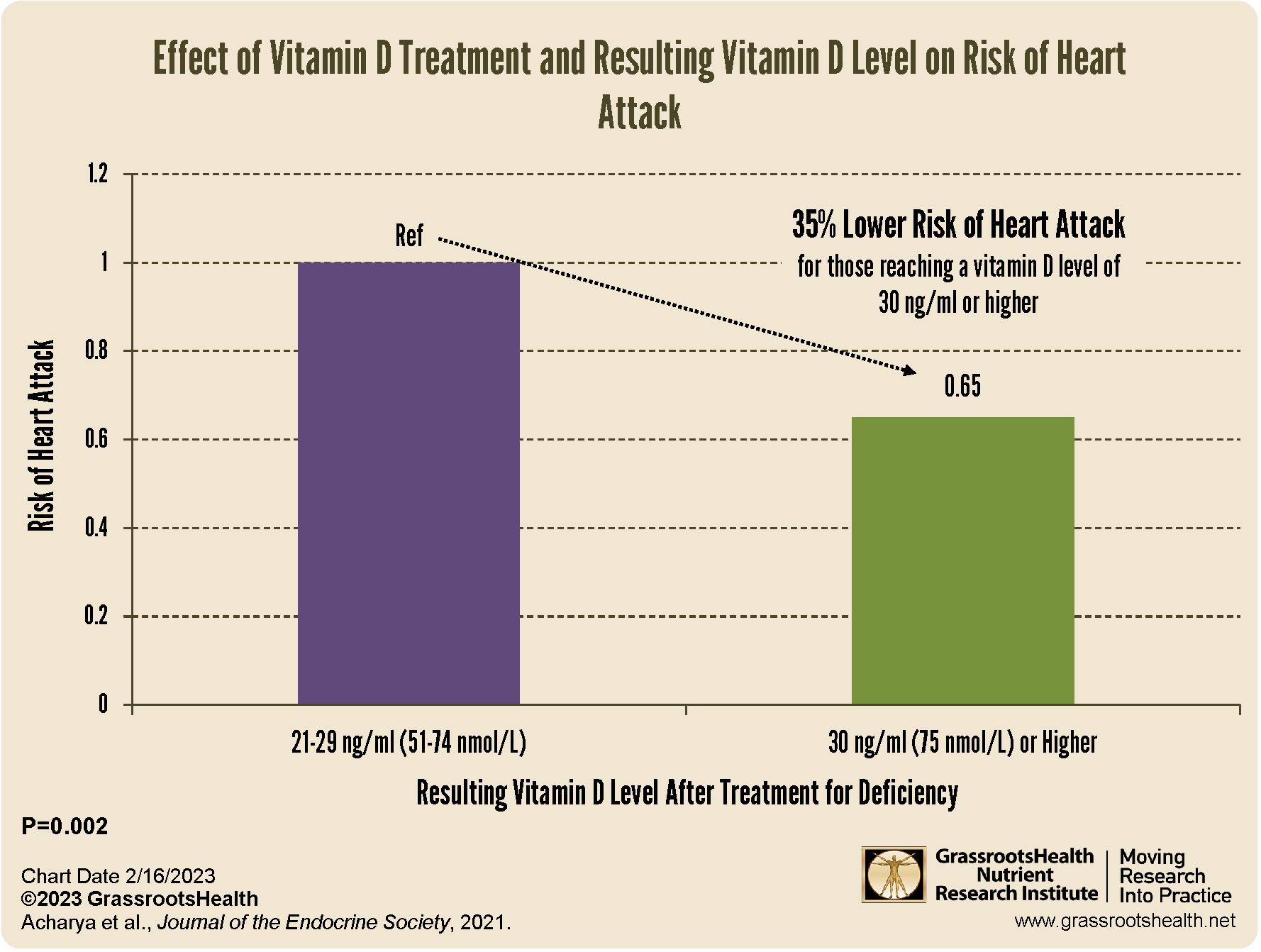Published on February 16, 2023
Plus: 20% Off Ends This Weekend! Save on measurements to help improve heart health, inflammation, and more.
Key Points
- Higher vitamin D levels have been associated with improved cardiovascular health, lower blood pressure, reduced risk of arterial stiffness, diabetes and insulin resistance, and maintaining glucose regulation and a healthy lipid profile
- A study among vitamin D deficient individuals without a history of heart attack found that those taking vitamin D and reaching a vitamin D level of 30 ng/ml or higher had a 35% reduced risk of future heart attack compared to those who supplemented for their deficiency but did not reach levels of 30 ng/ml or higher
- The study also found an approximate 40% decreased risk of all-cause mortality for all who supplemented with vitamin D and corrected their deficiency

This February, for Heart Health Month, we have focused on several key nutrients and health markers that deserve attention for improving or maintaining cardiovascular health, including omega-3 fatty acids, magnesium, vitamin D, C-reactive protein, and hemoglobin A1c.
Today, we bring the focus back to achieving and maintaining healthy target levels of vitamin D, which has been associated with improved cardiovascular health, lower blood pressure, reduced risk of arterial stiffness, diabetes and insulin resistance, and maintaining glucose regulation and a healthy lipid profile – all to the benefit of your heart!
Study Finds 35% Lower Risk of Heart Attack with Achieved Vitamin D Levels of 30 ng/ml or Higher
A study by Acharya et al. examined data from 20,025 patients without prior history of myocardial infarction (MI or heart attack) to determine the effects of vitamin D supplementation and resulting vitamin D level on the risk of MI and all-cause mortality. All patients were vitamin D deficient at baseline (less than 20 ng/ml or 50 nmol/L) and were divided into groups based on treatment and follow-up vitamin D levels as follows:
Group A – untreated, vitamin D level at or below 20 ng/ml (50 nmol/L)
Group B – treated, vitamin D level between 21-29 ng/ml (51-74 nmol/L)
Group C – treated, vitamin D level at or above 30 ng/ml (75 nmol/L)
When the risk of MI and all-cause mortality was compared between groups, the authors found
- a 35% decreased risk of MI in Group C compared to Group B (p=.002)
- no significant difference in MI risk between Group B and Group A
- an approximate 40% decreased risk of all-cause mortality for both Groups C and B compared to Group A (p<.001)
The authors concluded,
“In patients with Vit-D deficiency and no prior history of MI, treatment to the (25-OH)D level of >20 ng/mL and >30 ng/mL was associated with a significantly lower risk of all-cause mortality. The lower risk of MI was observed only in individuals maintaining (25-OH)D levels ≥30 ng/mL.”
Vitamin D Scientists Recommend a Vitamin D Level of 40-60 ng/ml (100-150 nmol/L)
While the above study found decreased risk with vitamin D levels of 30 ng/ml or higher, a panel of vitamin D scientists from around the globe recommends maintaining vitamin D levels of 40-60 ng/ml. These levels are associated with improved outcomes for many aspects of health. To see an example of the added risk reduction seen among several diseases when these levels are achieved, view our Disease Incidence Prevention chart for general health, as well as for prenatal and children’s health.
Take Care of Your Heart with Vitamin D & Other Important Nutrients! Discover Which Ones Your Heart Needs More of Today
In addition to vitamin D, research shows that the following nutrients are especially important to heart health:
OMEGA-3s
There are over 8,000 research papers available on heart health and omega-3s, showing many benefits of omega-3s for heart health
The recommended Omega-3 Index is 8% or higher – yet 85% of GrassrootsHealth participants were below this level
BALANCED OMEGA-6s & OMEGA-3s
Omega-6 fatty acids (such as AA) promote inflammation and the development of chronic disease
Omega-3 fatty acids (such as EPA) can help lower inflammation and reduce the risk of inflammatory diseases
The AA:EPA ratio and Omega-6:3 ratio are measures of pro/anti-inflammatory fatty acids; knowing these ratios can help you take more specific steps towards achieving lower levels of inflammation through diet and supplements
MAGNESIUM
Over 45% of the US population consumes less than the average daily requirement of magnesium, thus are very likely deficient
Magnesium deficiency is a contributor to CVD, with research showing its relationship to conditions such as atrial fibrillation, stroke, high blood pressure and heart failure
PLUS DIRECTLY MEASURE INFLAMMATION LEVELS IN THE BODY WITH hsCRP
CRP has been used for decades as a general marker of inflammation that can be measured in your blood
Elevated CRP levels have been linked to metabolic syndrome, future heart attacks, stoke, peripheral arterial disease, and the development of diabetes
Evidence suggests that levels below 1.0 mg/L indicate low risk of cardiovascular disease, levels between 1.0 and 3.0 mg/L indicate average risk, and levels between 3.1 and 10 mg/L indicate increased risk
AND MEASURE YOUR METABOLIC HEALTH WITH HbA1c
HbA1c is a measure of how healthy average blood sugar levels have been in the recent few months, and is a better representation of blood sugar health than a single glucose measurement
Higher levels of HbA1c are associated with higher levels of inflammation, a higher risk of metabolic syndrome and diabetes, and in turn, CVD
Choose from several test combinations of the above, with 20% off
Measure Your Vitamin D and Other Important Health Markers
 Having and maintaining healthy vitamin D levels and other nutrient levels can help improve your health now and for your future. Choose which additional nutrients to measure, such as your omega-3s and essential minerals including magnesium and zinc, by creating your custom home test kit today. Take steps to improve the status of each of these measurements to benefit your overall health. With measurement you can then determine how much is needed and steps to achieve your goals. You can also track your own intakes, symptoms and results to see what works best for YOU.
Having and maintaining healthy vitamin D levels and other nutrient levels can help improve your health now and for your future. Choose which additional nutrients to measure, such as your omega-3s and essential minerals including magnesium and zinc, by creating your custom home test kit today. Take steps to improve the status of each of these measurements to benefit your overall health. With measurement you can then determine how much is needed and steps to achieve your goals. You can also track your own intakes, symptoms and results to see what works best for YOU.
Enroll in D*action and Test Your Levels Today!







